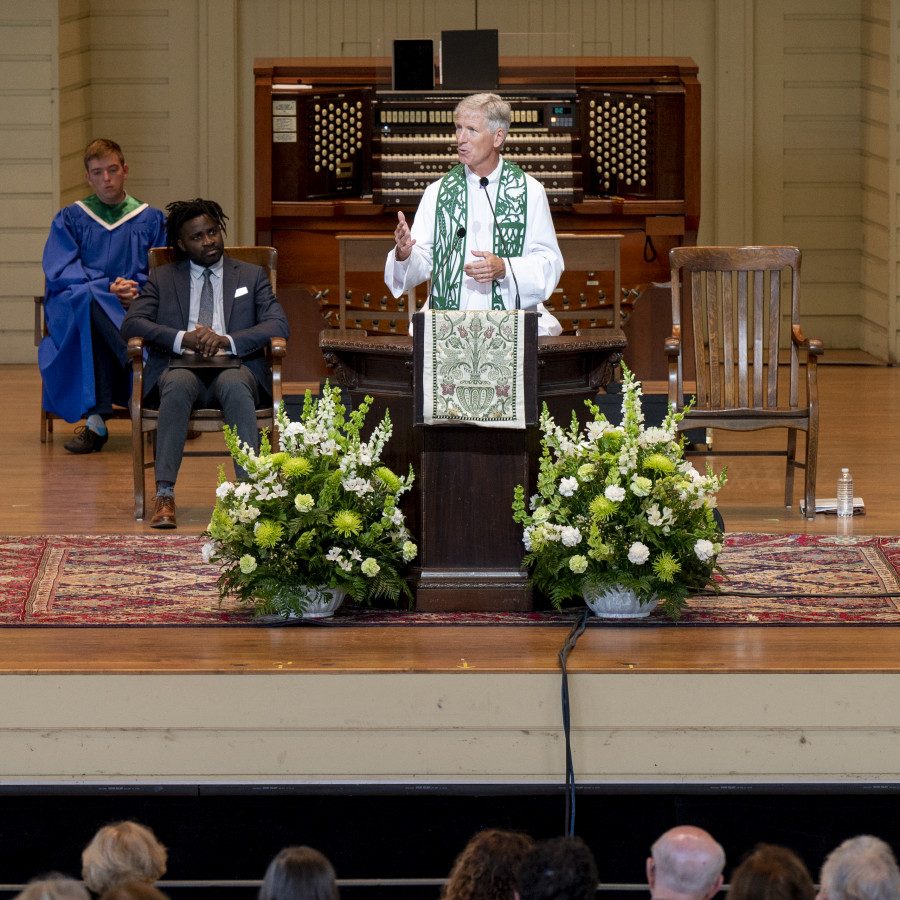MARY LEE TALBOT – STAFF WRITER

On Feb. 13, 1884, Theodore Roosevelt, then a member of the New York State Legislature, received a telegram that his daughter, Alice, had been born. He hurried home and “his life was plunged into a nightmare. His mother (had) died of typhoid fever and his wife, Alice, died shortly after giving birth,” said the Rev. Robert W. Henderson.
Henderson preached at the 9 a.m. Wednesday, July 21 worship service in the Amphitheater. His sermon title was “Walking Wounded,” The Scripture text was 2 Corinthians 4:7-12, 16.
Roosevelt wrote in his diary on Feb. 14, 1884, “X, the light has gone out of my life.”
To find solace, Henderson said, Roosevelt bought a ranch in the Badlands of South Dakota and hunted, fished and went on roundups with the ranch hands.
“His political colleagues back in New York thought he had flamed out like so many other young politicians,” Henderson said. “Roosevelt did not choose a gentle balm but engaged in challenges that would renew his confidence in the future so that he could emerge stronger and launch himself on a trajectory of public service.”
The apostle Paul was facing a similar situation with the Corinthians. Henderson said, “The Corinthians accused him of deception and assassinated his character.”
Paul had sacrificed almost everything and “his journey was not all peaches and cream,” Henderson told the congregation. “He survived beatings and shipwrecks and took no salary for his preaching. He proved that while death is striking us down bodily, if we dig deeper we find words of resilient faith. We have treasure in clay jars, so we know that our power is from God and not within us.”
Henderson quoted the verses in 2 Corinthians 4:8-10: “We are afflicted in every way, but not crushed; perplexed, but not driven to despair; persecuted, but not forsaken; struck down, but not destroyed; always carrying in the body the death of Jesus, so that the life of Jesus may also be made visible in our bodies.”
This inner nature that is renewed is a remarkable affirmation of faith, Henderson said. “This is resilience and perseverance. We know what that is like in the face of the pandemic.”
Jay Bilas, college basketball analyst for ESPN, wrote a book called Toughness: Developing True Strength On and Off the Court. Henderson said Bilas used basketball to describe ways to develop resilience in life.
First, move on to the next play. Don’t dwell on what did not work, just move on. Second, be hard to play against, but easy to be with a team. Third is excellence. Henderson said, “As I tell my staff, practice does not make perfect; perfect practice makes perfect.”
The difference between Bilas and the apostle Paul, said Henderson, “is that Paul grounds power in God’s resurrection and not in our own power. God chose our mortal bodies for resurrection power. Our bodies are fragile to show that the power is God’s. As I reach my sixth decade, I realize how much slower I am and I think golf is exercise.”
Extra power belongs to God for a purpose. “The purpose is not to dodge difficulty or to simply try harder. The purpose of the power of faith is to turn the scar tissue of adversity into the muscle of character,” Henderson said. He quoted British Prime Minister Benjamin Disraeli: “There is no education like adversity.”
Henderson told the congregation, “The pandemic has shown us that we are not in control of much. You remember the saying, ‘If you want to make God laugh, tell God your plans.’ ”
Illness, age, loss of love or marriage, or a fall, all show that outer things can waste away. “God makes our bodies a display case for resurrection power. God delights in giving us the inner strength to persevere,” Henderson said.
Henderson and his wife Suzanne made a pilgrimage to Assisi. “St. Francis must have been in great shape,” Henderson said, “because Assisi is very hilly, and the garden where he went to pray is at the top of a hill.”
At the entrance to the garden is a stone with an inscription: “All my life thou has been at the helm though very secretly.”
Henderson said, “This saying has become the North Star in my life. I pray that the same one will come and stand at the helm of your life. When you are enrolled in the university of adversity, you will have this inner treasure renewed day by day.”
The Rev. Natalie Hanson presided. The Rev. Carolyn Grohman, a retired Presbyterian Church (U.S.A.) minister, read the Scripture. The prelude and postlude were improvisations by Joshua Stafford, who holds the Jared Jacobsen Chair for the Organist and is director of sacred music. Members of the Motet Choir sang “If We Believe That Jesus Died,” with lyrics from I Thessalonians 4:14, 18, and music by John Goss. The Mr. and Mrs. William Uhler Follansbee Memorial Chaplaincy and the Jackson-Carnahan Memorial Chaplaincy provide support for this week’s services and chaplain.




